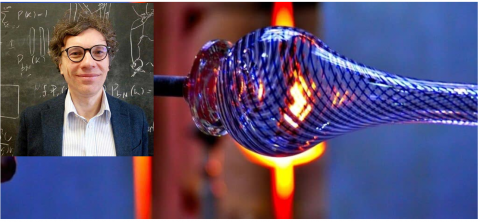Predicting the failure of two-dimensional silica glasses
Tuesday, MAY 31st 2022 13:00 (1.00PM CET)
Predicting the failure of two-dimensional silica glasses
Prof. Stefano Zapperi, University of Milan
Abstract:
Being able to predict the failure of materials based on structural information is a fundamental issue with enormous practical and industrial relevance for the monitoring of devices and components. Thanks to recent advances in deep learning, accurate failure predictions are becoming possible even for strongly disordered solids, but the sheer number of parameters used in the process renders a physical interpretation of the results impossible. Here we address this issue and use machine learning methods to predict the failure of simulated two dimensional silica glasses from their initial undeformed structure. We then exploit Gradient-weighted Class Activation Mapping (Grad-CAM) to build attention maps associated with the predictions, and we demonstrate that these maps are amenable to physical interpretation in terms of topological defects and local potential energies. We show that our predictions can be transferred to samples with different shape or size than those used in training, as well as to experimental images. Our strategy illustrates how artificial neural networks trained with numerical simulation results can provide interpretable predictions of the behavior of experimentally measured structures.
Bio:
Stefano Zapperi is currently professor of theoretical condensed matter physics at the University of Milano and coordinator of the Center for Complexity and Biosystems. He graduated in physics at the University of Rome “La Sapienza” and received his Ph.D. in physics from Boston University. After a postdoctoral position at ESPCI in Paris, he became tenured researcher at INFM at the University Rome and then at the University Modena and Reggio Emilia. He became then senior researcher at CNR-IENI in Milano. He has been invited as visiting scientist or visiting professor in many institutions worldwide, including Cornell University, Aalto University, ENS, Boston College, Rice University and the Weizmann Institute of Science. Prof. Zapperi in an expert in the statistical physics of complex systems and has contributed to the fields of materials science, biophysics and systems biology. His most notable contributions include the theory of the Barkhausen noise in magnets, the statistical physics of plasticity and fracture, and recent work on the physics of cancer and protein aggregation. He published more than 200 scientific papers in the top scientific journals, including 4 in Nature, 3 in Science, 5 in PNAS and 32 in Phys. Rev. Lett. gathering more than 10000 citations (scholar). In 2017, he co-authored with Caterina La Porta a book on the Physics of Cancer. Prof. Zapperi is the recipient of numerous awards including the Marie Curie Excellence Award, the Humboldt Research Awards, the Advanced Grant from the European Research Council. He was elected fellow of the American Physical Society and named Finland Distinguished Professor by the Academy of Finland. He is member of the editorial boards of JSTAT and Physical Biology.









